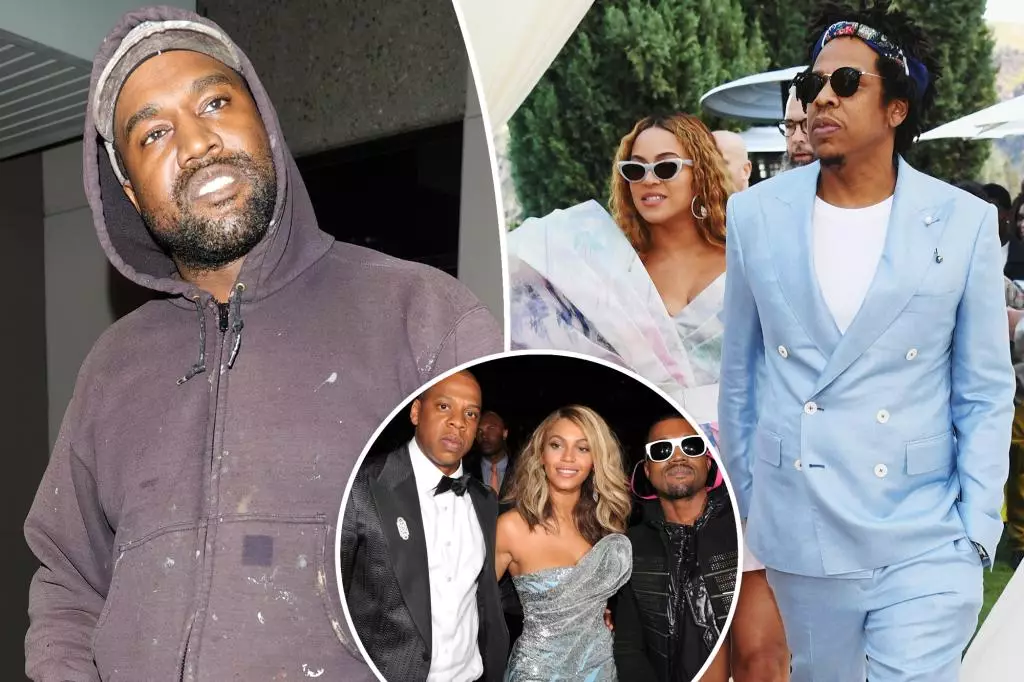In the tumultuous world of celebrity dynamics, few relationships are as intriguing and complicated as that of Kanye West and the power couple Jay-Z and Beyoncé. Recently, West stirred the pot with alarming comments about the couple’s children, leading to a wave of backlash. However, what is more captivating than the incendiary remarks themselves is the context that surrounds West’s claims and the deep-seated emotions they reveal. At the heart of West’s online tirades lies a perplexing blend of admiration, betrayal, and vulnerability, facets that define much of his public persona.
West’s erratic behavior often leads to widespread media coverage and public scrutiny, but what remains consistent is his unwavering desire for acceptance and belonging. The rapper expressed feeling “like the black sheep” in the entertainment industry, seeking familial bonds amidst the superficiality of fame. The absence of Jay-Z and Beyoncé at his lavish wedding to Kim Kardashian in 2014, an event thought to symbolize unity in the hip-hop community, appears to have left a profound mark on West. It signifies not just a personal slight but also encapsulates his yearning for approval from those he considers peers.
The Pain of Perceived Rejection
In his public musings, West claimed that the Carters could have utilized their cultural influence to support him, possibly providing him with the leverage he felt he desperately needed in his tumultuous co-parenting relationship. His accusations that they “could have used their cultural position” reveal a deeper dissatisfaction—one that perhaps speaks to times he felt undermined or unvalued within the industry. It’s a painful admission that juxtaposes admiration with bitterness, illustrating how quickly friendships can unravel under the weight of emotional grievances.
Additionally, West’s irate comments directed towards Jay-Z and Beyoncé’s children, questioning their mental capacities, illustrate a dangerous cycle of resentment that he has allowed to fester. By targeting the most vulnerable aspects of another person’s life, it draws attention to the fragility of West’s emotional state. His subsequent backtracking—claiming his actions were not rooted in being a “good person” but rather a fear of social media repercussions—raises questions about accountability and self-awareness in times of emotional upheaval.
A Pattern of Public Meltdowns
This public fallout is not an anomaly for West. His history of erratic behavior—particularly his notorious 2016 outburst directed at Jay-Z—highlights a troubling pattern where personal pain manifests in public confrontations. Jay-Z addressed their estrangement in his 2017 track “Kill Jay-Z,” a comeback that encapsulated the pain of betrayal and the difficult nature of their friendship. In this delicate back-and-forth, both artists demonstrate the stark reality of fame; even those with immense talent and shared history can fall victim to misunderstandings, jealousy, and wounded egos.
Despite all the chaos, West’s artistry and vulnerability remain captivating. His ability to articulate his internal struggles—often through controversial means—leaves fans and critics alike contemplating the nature of fame and the human condition. The seeming paradox of an artist who craves connection yet pushes away those who genuinely care complicates any understanding of him.
Impact Beyond Celebrity Feuds
The implications of this contentious dynamic extend beyond personal grievances; they also reflect larger issues in the entertainment industry, where public personas often clash with private realities. Instead of fostering supportive networks, the highly competitive and sometimes isolating nature of fame can lead to destructive rivalries. This scenario not only impacts West as an individual but also poses questions on how friendships can diminish under public scrutiny, exacerbating feelings of isolation and alienation.
As this ongoing narrative unfolds, it serves as a reminder of the fragile interplay between celebrity, friendship, and mental health. While some may choose to dismiss West’s actions as mere antics of a troubled star, understanding the underlying motivations of his statements offers a window into the deeper emotional battles that many face in a world obsessed with image and performance. Whether West can reconcile his emotions or will continue to spiral into further controversy remains to be seen, but the world watches and waits, captivated by the unfolding drama.
